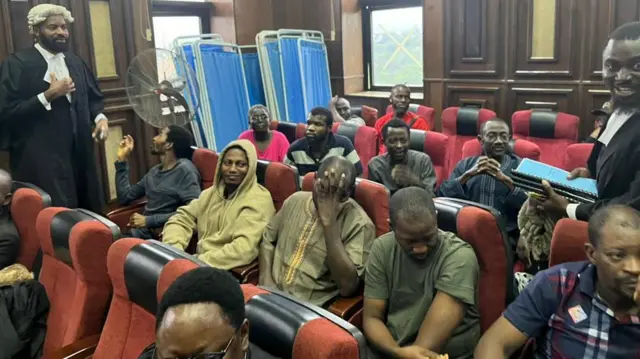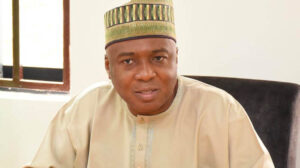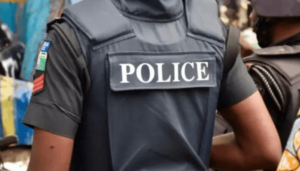A report by the Rule of Law Accountability and Advocacy Centre (RULAAC), has lamented the increasing spate of human rights abuses and the general suppression of freedoms in Nigeria.
The report titled; “Growing pattern of repression against civil rights and freedoms in Nigeria,” highlighted a series of abuses under the watch of the current government including; abduction style arrest, detention in deplorable conditions, denial of family members information about their loved one’s condition, judicial complicity and many others.
The report, signed by RULAAC’s executive director, Okechukwu Nwanguma recommended legal reforms especially on detention, upgrade of holding facilities, and guarantees for medical, nutrition and sanitation requirements of detainees.
The report reads in part; “RULAAC is gravely concerned about President Bola Ahmed Tinubu administration’s increasing repression of civil rights and freedoms in Nigeria. RULAAC notes the administration’s growing intolerance for dissent, its response to peaceful protests, and the treatment of demonstrators.
Illegal Arrests
“Law enforcement agencies abuse legal procedures as well as the legally stipulated safeguards against abuse of discretionary powers. Many who participated in the #EndBadGovernance protests in August 2024 were subjected to arbitrary detentions without proper identification or cause by the arresting authorities, resembling abductions rather than lawful arrests. Many were held incommunicado and denied access to family, legal representation, and medical care.
Inhumane Detention Conditions
“Detained individuals face overcrowded, unsanitary, and dangerous conditions in police cells, amounting to torture and degrading treatment. For example, many persons detained at the NPF- IRT situated at the old Abbator (premises of the disbanded SARS), Abuja reported contracting serious skin infections, were poorly fed and had no access to alternative proper feeding, resulting in many starving. Many persons in detention have no reason to be detained. The detention conditions and the exposure of young innocent persons to hardened criminals can negatively influence them.
Lack of Communication
“Families are often uninformed and kept in the dark about the status, location, and conditions of detained individuals, exacerbating their suffering and compounding their distress. This is a flagrant violation of the due process safeguards provided under the Police Act 2020.
Judicial Complicity
“The judiciary has been complicit in the denial of justice, enabling prolonged detention through granting frivolous applications for extended detention by law enforcement. When charged, stringent court bail conditions make release nearly impossible.
Misuse of Counterterrorism and other Laws
“Authorities misapply Laws intended for counterterrorism, cyber security, and public order to charge peaceful protesters with serious offenses even when there is no evidence of conspiracy. Many of the protesters charged before the FCT High Court were arrested from different states and had no connection prior to their arrest. But they were lumped together and charged with terrorism and conspiracy and are currently languishing in prison.
Financial Repression
“Protesters face financial restrictions, including frozen bank accounts and intercepted travel plans, limiting their ability to mobilize or escape persecution. Suspected protest organizers have also been placed on security watch list, arrested at airports, and their travel documents seized, thereby preventing them from traveling.
Suppression of Free Speech
“The Tinubu government’s stance has contributed to a shrinking civic space, fostering fear among citizens and stifling dissent, potentially leading to political unrest.
“These actions indicate a broader pattern of repression against civil rights and freedoms in Nigeria, raising concerns about the state of democracy and governance in the country.
Addressing Inhuman Detention Conditions in Nigeria
“Measures should be put in place to address inhuman detention conditions in Nigeria. This requires a multi-faceted approach. But in the present context, key measures may include:
Legal Reforms: Enforce Legal Standards:
“Implement laws aligning detention conditions with international human rights standards.
Improved Infrastructure: Upgrade Facilities:
“Renovate and maintain detention facilities to ensure they are safe, hygienic, and capable of accommodating detainees without overcrowding.
Health Care Access: Regular Health Check-ups:
“Ensure timely medical examinations and treatment for detainees, including mental health support.
Sanitation Improvements:
“Provide adequate sanitation, clean drinking water, and hygiene supplies to prevent infections.
Nutrition: Standardized Feeding Programs:
“Ensure all detainees receive sufficient and nutritious meals regularly.
Monitoring and Accountability:
“Establish oversight mechanisms to monitor feeding practices and ensure compliance.
Staff Training: Human Rights Training:
“Provide training for law enforcement and detention staff on human rights practices, dignity, and respectful treatment of detainees.
Oversight and Accountability: Independent Inspections:
“Allow independent bodies such as the National Human Rights Commission to conduct regular inspections of detention facilities to assess conditions and compliance with standards. Nigerian government should also implement its obligations under international human rights law particularly its obligation under the Optional Protocol to the Convention Against Torture (CAT) to establish a National Preventive Mechanism for periodic monitoring of places of detention in the country.
Reporting Mechanisms:
“Establish clear channels for detainees to report abuse or poor conditions without fear of retaliation.
“By implementing these measures, Nigeria can make significant strides towards improving detention conditions and safeguarding the rights and dignity of detainees.
Judicial responsibility and integrity
“The Nigerian judiciary must commit to its crucial role in upholding justice, particularly concerning the treatment of individuals charged with offenses.
“The Nigerian judiciary has a pivotal role in ensuring justice by exercising careful discretion in legal proceedings. By critically scrutinizing charges, limiting unjust detention extensions, and establishing reasonable bail conditions, the judiciary can protect individual rights, uphold the rule of law, and contribute to a fairer society.
Scrutinizing Charges: Reviewing Evidence:
“Judges should critically assess the evidence presented by law enforcement to ensure that charges are substantiated and not based on arbitrary or malicious grounds.
Preventing Abuse of Process:
“By carefully examining the validity of charges, the judiciary can prevent the misuse of laws, such as counterterrorism laws, against peaceful protesters.
Avoiding Unmerited Extensions: Limiting Detention Duration:
“The judiciary must consider the rights of detainees and ensure that requests for extensions of detention are only granted when substantial reasons are provided.
“Guarding Against Frivolous Applications: Judges should reject applications for prolonged detention that lack credible evidence or justification, promoting a fair legal process.
Ensuring Reasonable Bail Conditions: Setting Fair Bail Terms :
“Judges have the discretion to establish bail conditions that do not disproportionately burden defendants, ensuring that those awaiting trial are not subjected to undue hardship.
Facilitating Access to Bail:
“By making bail terms achievable, the judiciary helps prevent overcrowding in detention facilities and upholds the presumption of innocence.
Impact on Justice System: Restoring Public Confidence:
“By exercising discretion responsibly, the judiciary can enhance trust in the legal system and demonstrate commitment to human rights and justice.
Promoting Accountability:
“Active judicial oversight can hold law enforcement accountable, reducing instances of corruption and abuse across the criminal justice system.
Supporting Civic Space:
“A judiciary that upholds individual rights fosters an environment where citizens feel free to participate in peaceful protests and advocacy without fear of unjust repercussions.
CALLS :
“In light of these issues, RULAAC calls on the Tinubu administration to:
- Release all individuals arrested for participating in peaceful protests.
- Drop all charges against all those charged with terrorism and other unfounded allegations
- Cease harassment of citizens exercising their constitutional rights.
- Uphold and commit to democratic values and practices.
RULAAC emphasizes that these measures are necessary to protect democracy and governance in Nigeria.”










More Stories
Sexual harassment: Saraki cautions Akpabio against trivializing call for investigation
Secondary school pupils engage community youths in bloody clash over girlfriend in Niger community
Reverse Natasha Akpoti’s suspension or face legal action, SERAP warns Akpabio